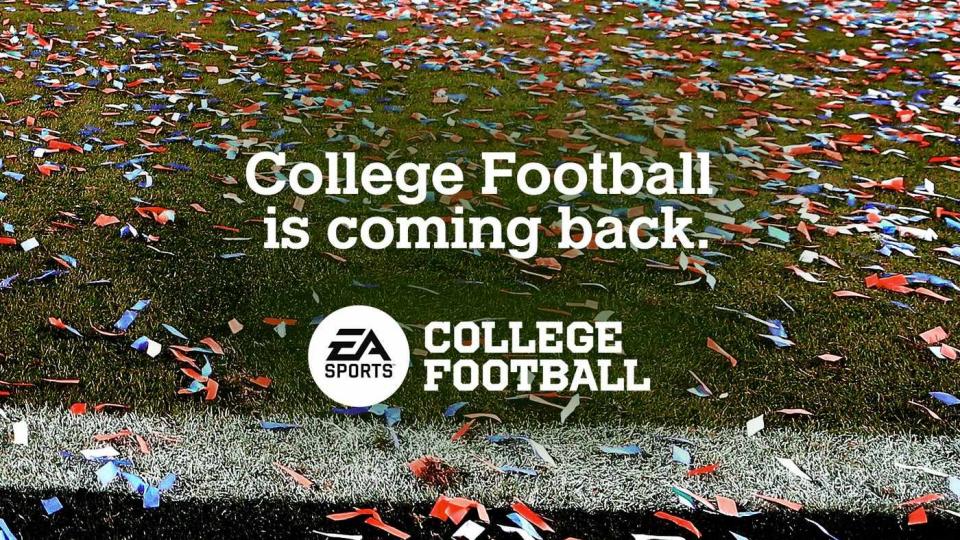OPINION: I Don’t Care About Your Video Game, Realignment Rumor Or TV Deal, So Please Shut Up About It

PHILADELPHIA, PA – Today has been a typical day in the college football offseason, meaning it’s been a day where countless articles and tweets have been posted about nonsense that nobody, not least I, care about.
Sports media at large, in their effort to try to get my attention, has resorted to the same old tricks that have worked in the past. Name, Image, Likeness, or NIL. Realignment rumors. TV deals for conferences. EA Sports. Deion Sanders.
It all doesn’t matter.
It doesn’t matter to me, it doesn’t matter to almost everyone, and increasingly it seems like it doesn’t matter to the NCAA.
Therefore, why should I pretend to care about it?
The noise level in college sports media has been deafening, a 24/7 whirlwind of a brand-new “outrage” each week that folks think I should care about.
This week, some of “big news” in the world of college athletics are that seven of the ACC schools are looking into possible breaking their Grant of Rights.
I don’t know what the Grant of Rights are. I don’t know why some people find they are important. Frankly, I’m not going to try.
Why should I care? I am a fan of Patriot League football, a league that appears to be playing a recruiting game and football program that increasingly looks unrecognizable to the money-grubbing, slime-oozing NIL sports agent game played by the ACC, SEC, and other football conferences.
So the ACC’s member schools are renegotiating some contract that pays the school billions more. The coverage is being tweeted with the leader “BREAKING”, as if it’s some major piece of information that affects my life.
Why should I care? To me, this is like being mad at Luxembourg’s renegotiation of their top earning tax rate. What, praytell, does this have to do about my school?
Alongside these articles, covered with a breathless quality that is more suited to Royal Family sightings or Pete Davidson news, are more sportswriter speculation on a “wave” of “realignment”, as if the “wave” is at all important, at all true, or a “wave” at all.
At one time, it felt like the schools of the ACC and the schools of the Patriot League had most things in common.
I’m not naive enough to think that everything in the ACC was wholesome and devoid of money or scandal (no conference is immune, not even the Patriot League).
But at least it seemed like they were all broadly under the same umbrella, looking out to the future, broadly, in the same direction.
The field was still 100 yards, athletes couldn’t just jump through schools the way Kim Kardashian goes through boyfriends, schools didn’t have to deal directly with boosters coming at kids with slush funds of questionably sourced money (complete with agents), and kids had to at least make an effort to stay at a school for multiple years and at least make some sort of effort towards progress towards a degree.
Even the wealth of the schools and conferences had some sort of redistributive feel about about it. Certainly, football and men’s basketball made lots of money. Certainly, the big conferences made most of the money. But it felt like the circus of those two sports at least had the positive effect of lifting up funding of entire sports – not just at Stanford or Auburn, but for the entire membership of the NCAA as a whole. There was at least the feeling of everyone’s boat being lifted, not just Penn State’s.
Today that’s been perverted into something I don’t recognize.
I, like many people, did not get into college sports to study legal opinions and cheer on lawyers. I came to study the triple-option, spread offenses, the Air Raid offense, the 3-3-5 defense, and actual football games on the field. I came for the uplifting stories of the players, and the fact that so many of these athletes can both reach their peaks on the field and get a degree to achieve their peaks in life, before money and lawyers come in and ruin everything, as they are proving they do.
Realignment at one time was a fun offseason game where one wondered where schools might choose to go to play nearby schools, develop new rivalries, or shun former rivals. Now, if Texas joins the Pac 12, the SEC or wherever, everyone has abandoned the pantomime theater that’s about some nonsense like “synergy” or “alignment of values.” Once USC and UCLA decided to join the Big 10, it was clear the only thing fueling these rumors was money. Oh, yeah, and lawyers.
More importantly to me, what does it matter to Patriot League schools? Nothing! To me, caring about what happens in the Big 10 or SEC is like worrying about the geopolitics of Belgium. It’s about something that doesn’t affect my league. I don’t want to read about it.
Recently, ESPN and many other national media members reported on EA Sports’ long-awaited plan to resume of their NCAA Football video game franchise. This video gamization of college sports was the subject of a Supreme Court lawsuit, it was referred to constantly in terms of NIL, and now it’s apparently coming back.
Arguably the O’Bannon lawsuit is what brought us to this moment – NIL collectives, paying (some) players truckloads of money, and now a mechanism to get players money for appearing as an avatar in a football game.
The irony is that all this talk about NIL, EA Sports, and this game is that it ignores the main reason anyone would want to buy this game – to sack, say, Stetson Bennett dozens of times in a single game.
If you’re a college quarterback wanting to get paid to be in a football game, you are essentially getting paid to allow young men and women the fantasy to pound your face into the turf in Sanford Stadium over and over again, repeatedly.
I cannot emphasize enough how little this interests me, or how little it interests most people.
First of all, you may not be able to sack Stetson Bennett, or whomever the next Stetson Bennett will be in this game. We don’t know if they will allow their Name, Image or Likeness to be put into the game, or even whether this reboot of this years-dormant franchise will be any good, or whether people will buy it.
I know that I don’t have any interest in buying it or playing it. Because from all indications it doesn’t have FCS schools, or HBCU schools.
When EA Sports was making college football games in 2007, I was very interested in playing their games because they represented many FCS teams by name and made it pretty easy to build a team if you didn’t.
Without that, I’m completely not interested. And while that’s an interesting footnote for history, I know for a fact that there are a lot of people out there that feel the same way. Add to that HBCUs, and you have a very, very large aggregate audience that doesn’t care about the game.
So why should I care about EA Sports, or this game, or that some kids are going to get a paycheck to see their faces piledriven into the turf by young men and women? That’s fine if EA Sports makes money on it, and it’s now legal for the college football players to get some money. But I do not care!
ESPN, FOX, sports media – I don’t care about the SEC, the Big 10, the ACC, NIL, or, increasingly, the NCAA. If the SEC gains Texas, it means nothing to me. If the ACC gets some sort of TV deal, it means nothing to the Patriot League. If some athlete is foolishly thrown millions of dollars to play football at an ACC school – I don’t care!
I want to read about things that affect Patriot League schools. If the winner of the FCS National Championship gets their college educations paid for by the NCAA, I’m all ears. If EA Sports is going to include Patriot League and Ivy League schools in it, sign me up. Setting up a national fund to pay for all the kids’ medical bills until they’re 30 – tell me about it. Setting up scholarship limits to prevent schools like, say, Auburn, Miami and Ohio State from cheating – tell me more. Leveraging the rules to make a level playing field between all FCS schools – interested. Closing down the NCAA’s transfer portal, because it’s ruining the game – interested.
But the way things stand now – so much of the uncurated content blasting out of college football media doesn’t matter. And to the vast majority of college football players, parents and students – it shouldn’t either.

Chuck has been writing about Lehigh football since the dawn of the internet, or perhaps it only seems like it. He’s executive editor of the College Sports Journal and has also written a book, The Rivalry: How Two Schools Started the Most Played College Football Series.
Reach him at: this email or click below: